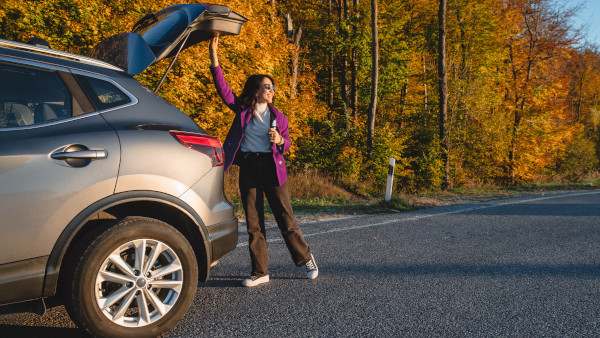Getting ready to hit the road for a fantastic British holiday?
At Rivervale, we want to make sure your car is up for the adventure. Whether you're planning a staycation exploring the beautiful Sussex countryside or a grand tour across the UK, a little preparation can go a long way.
Live near Brighton or anywhere in Sussex? Before you set off, book your car in with Rivervale for a pre-holiday safety check. Our expert technicians, trained by BOSCH, will give your vehicle a thorough inspection to ensure it's safe and reliable for your trip. Now, let's get your car holiday-ready!
Get booked in with an expert technician
Book nowBefore You Hit the Road
Get Your Car Holiday-Ready: Your car will be working extra hard on a road trip, so it's important to give it a checkup before you go. Check your owner's manual for specific recommendations, but here are some general tips:
- Tyre Pressure: Make sure your tyres are inflated to the recommended pressure for the weight you'll be carrying. This will help improve fuel efficiency, reduce tyre wear, and give you better handling.
- Don't Overload: Avoid exceeding the weight limit specified in your car's manual. This can put extra strain on the engine and brakes.
- Safety Kit Check: Make sure your jack, toolkit, hazard warning triangle, and first-aid kit are all in good condition and easily accessible.
- Top Up Fluids: Check and top up your windscreen washer fluid and antifreeze if necessary. Also check your oil level.
Packing Smart for a Safe Journey
Pack Like a Pro: Loose objects become dangerous projectiles in a sudden stop. Here's how to pack safely:
- Heavy Goes Low: Place the heaviest items in the boot, right behind the back seats.
- Don't Block the Back: In estate cars and vans, don't stack luggage higher than the backrests unless you have a secure partition.
- Fill the Gaps: Try to pack items tightly together to prevent them from shifting around.
- Secure the Load: Use straps or a non-slip mat to keep everything in place.
- Clear Driver's View: Make sure your luggage doesn't obstruct the driver's view in any direction.
- Easy Access: Keep the first-aid kit and hazard warning triangle within easy reach.

Travelling with Roof or Rear Racks
Load Up Safely: If you need extra space, a roof rack or rear-mounted carrier can be a big help. But it's important to use them safely:
- Stay Within Limits: Never exceed the maximum weight limit for your car's roof and roof rack.
- Lighten Up on Top: Store the lightest luggage on the roof as it can affect the car's handling.
- Lights on Back: If your rear rack obscures your taillights, make sure it has its own working lights.
- Double Check: Regularly check that your roof and rear rack cargo is secure throughout your trip.
Towing a Caravan
Safe Towing Tips: Caravans offer a comfortable and convenient way to travel, but towing one requires extra care:
- Secure the Load: Use straps or non-slip mats to keep your caravan luggage from moving around.
- Weight Distribution: Place heavy items low and in the centre of the caravan for optimal handling and braking.
- Adjust Your Driving: Be aware of increased stopping distances and reduced acceleration when towing a caravan.
- Stay in Control: If your caravan starts to skid, gently ease off the accelerator and steer carefully to regain control.
Planning Your Journey
Start Smart: Don't pick your departure time solely based on traffic conditions. Consider your own alertness levels. Most people perform best in the morning (8 am to noon) and early evening (4 pm to 7 pm). Concentration tends to dip in the afternoon (2 pm to 4 pm) and especially after midnight. So, aim for an early start and schedule a long break around 2 pm. Avoid night drives if possible due to reduced visibility and alertness.
Pre-Departure Checklist
Double Check Everything: With all the excitement of a holiday, it's easy to forget things. Here's a quick checklist before you set off:
- Is the load secure?
- Are headrests adjusted correctly?
- Are child seats secure and everyone buckled up?
- Do you have all necessary documents (passport, driving licence etc.)?
- Are you aware of driving regulations in different countries?
Taking Breaks
Stay Alert, Stay Safe: The longer you drive without a break, the more fatigued you become and the greater the risk of an accident. Take a break every 3-4 hours at most, and get some fresh air. If you're travelling with children, stop more frequently. Be especially mindful of the afternoon dip in alertness and plan a longer break during this time. Avoid heavy meals and snack throughout the day to stay energised. Look out for signs of fatigue such as heavy eyelids, constant yawning, and slowing reactions. These are warning signs to pull over and rest before
We hope the traffic is kind wherever you are travelling, and you have a safe and pleasant trip.
Want an expert check?
Our technicians can carry our a vehicle health check to give you peace of mind before you travel.












